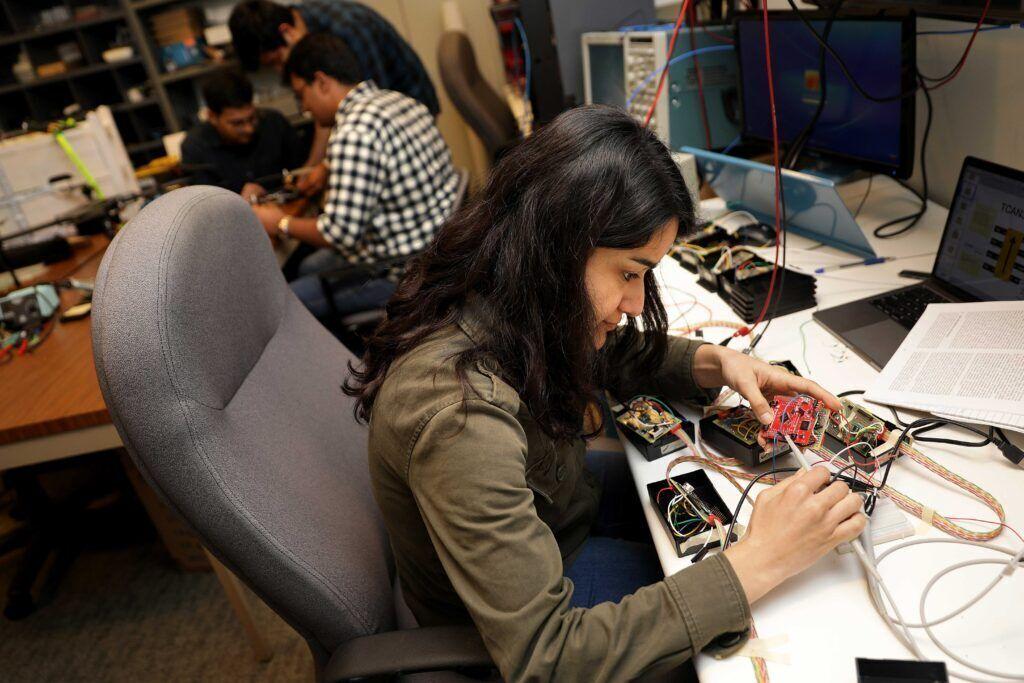Commentary: To protect the nation, Virginia must remain an innovation leader
Op-ed piece for The Richmond Times-Dispatch by CCI Executive Director Luiz DaSilva, March 8, 2024
Today’s international conflicts are fought on many fronts, and one of them relates to the mobile phones that we use every day.

Operators such as AT&T, Verizon and T-Mobile rely on network equipment provided by a handful of telecommunications vendors. The commonwealth’s investment in cybersecurity innovation, research and workforce development has placed Virginia at the forefront of the United States’ efforts to drive innovation in this market.
Through recent decades, China has pursued leadership in wireless networks, becoming a dominant force in the standardization of cellular technologies. China-based Huawei currently has the highest market share among telecom equipment vendors and Chinese companies’ dominance is being particularly felt in emerging economies, where they compete aggressively on price.
Why does that matter? For one, there is the issue of the United States’ economic strength and competitiveness. At an event recently hosted at Virginia Tech, U.S. Secretary of Commerce Gina Raimondo said, “We want to lead the world and outcompete the world, and to do that we have to out-innovate the world.” It is in our interest to promote greater innovation and competition in the wireless market.
There is also the vital issue of national security. Communication networks are a key component of our critical infrastructure. Given Chinese telecommunications companies’ dominance in the telecommunications equipment marketplace there are widespread concerns about network security and privacy.
Enter Open Radio Access Networks, or O-RAN, which will help add innovation and diversity into the marketplace. O-RAN breaks the functionality required for communication networks into smaller blocks and creates open standards for the interfaces between those blocks.
Imagine the current wireless network as a single, monolithic hardware and software combination that operators purchase from a single vendor. O-RAN creates instead a Lego-like network, with each piece potentially coming from a different vendor. Open interfaces in O-RAN work like the connectors that enable the pieces to snap together. The idea is to diversify the telecommunications supply chain, lowering barriers to entry for smaller players and spurring innovation.
The CHIPS and Science Act appropriated $1.5 billion for the Wireless Supply Chain Innovation Fund, which is closely aligned with developing and testing O-RAN-compliant networks. Virginia’s own U.S. Sen. Mark Warner is widely credited with spearheading this aspect of the act.

Researchers and developers around the world are working to make these networks secure from cyberattacks and ensuring they achieve the highest performance. To this end, the Wireless Innovation Fund, administered by the National Telecommunications and Information Administration (NTIA), has recently made $150 million in awards to U.S. companies and universities.
Virginia is front and center in this effort. Five years ago, our General Assembly created the Commonwealth Cyber Initiative (CCI), bringing 45 universities and colleges across the state together with a shared mission of research, innovation and workforce development in cybersecurity. In 2020, the initiative started building an O-RAN-compliant test bed with both indoor and outdoor facilities; in 2021, we joined the O-RAN Alliance; in 2023, we were designated an Open Testing and Integration Center. As a result, Virginia researchers have now been funded in five of the projects selected by the NTIA to advance O-RAN.
One of those, recently announced, is a $42 million project led by AT&T and Verizon. The Washington, D.C.-area hub of the project will be the Commonwealth Cyber Initiative’s “xG Testbed,” located at the Virginia Tech Research Center in Arlington. The testbed is the largest of its kind, and our students benefit from being trained in these unique research facilities and participating in projects that involve close collaboration between industry and academia.
The next few years will be critical in determining the shape of the wireless networks market, and it is vital that the U.S. regain leadership in this space.
Virginia is leading the country by driving innovation and building the workforce that will design, deploy, run and secure our wireless networks. Together, we will ensure the reliability of the services we individually use each day and the wireless infrastructure critically needed to secure our nation.


